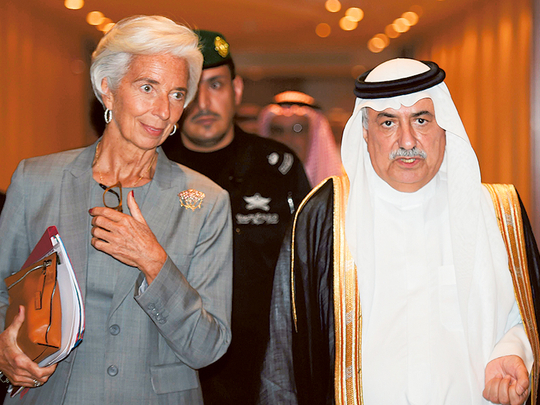
Dubai, Riyadh, Cairo: IMF Managing Director Christine Lagarde said Egypt is facing a currency crisis that should be tackled based on local circumstances, though history shows that “rapid” exchange-rate action works best in countries with low reserves and a wide gap between official and black market rates.
The most populous Arab country is gripped by a foreign-currency shortage that has battered business activity and raised fears of spiralling inflation. Lagarde said this month that Egypt needs to address exchange-rate and subsidy policies, fuelling speculation that policymakers will either devalue or float the pound and raise energy prices before securing IMF support.
“In terms of exchange rates, there is currently a crisis, because if you look at the official price and you look at the grey market price, there is a 100 per cent difference — and that needs to be addressed,” Lagarde said in an interview with Bloomberg Television in Riyadh on Thursday.
“When you have very low reserves, when the difference between the official and unofficial rate is very wide, historically, we have seen rapid transitions being most efficient, but it’s really a matter of circumstances. In other cases, it has been gradual.”
Egypt is turning to the IMF as it seeks to restore investor confidence in an economy that’s been undermined by persistent political unrest since the Arab Spring uprising. Many investors and tourists have shunned the country since then, putting pressure on foreign-currency reserves, which have tumbled more than 40 per cent since 2011.
Securing funds:
Lagarde said Egypt is “very close” to securing as much as $6 billion in bilateral financing required to seal a $12 billion loan from the International Monetary Fund. The lender’s board will “hopefully” approve the request in a few weeks, she said.
“We really strongly welcome the fact that the Egyptian authorities are deciding to address” issues, Lagarde said. “If they decide to move forward, we will certainly support that move, we will certainly accompany it and we will put money on the table to help them along the way.”
Lagarde’s comments suggest that the loan agreement may be held up, said Simon Williams, HSBC Holding Plc’s chief economist for central and eastern Europe, the Middle East and North Africa.
“After all of the initial fanfare suggested, we’d hoped that the deal would be concluded quickly,” he said. “That’s not been the case, and Lagarde’s comments suggest there’s more delay coming.”












